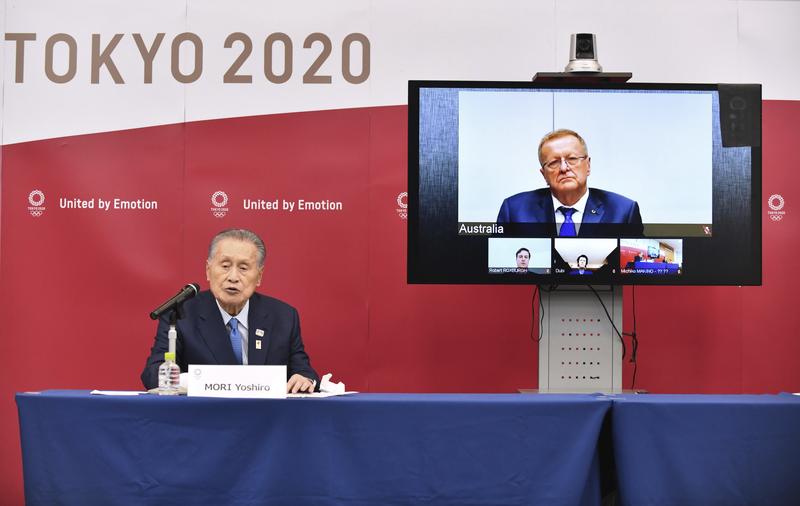 Tokyo 2020 Organizing Committee President Yoshiro Mori, left, speaks in teleconference with John Coates, chairman of the IOC's Coordination Commission for the Tokyo 2020 Olympic Games, in Tokyo, April 16, 2020. (KAZUHIRO NOGI / POOL PHOTO VIA AP)
Tokyo 2020 Organizing Committee President Yoshiro Mori, left, speaks in teleconference with John Coates, chairman of the IOC's Coordination Commission for the Tokyo 2020 Olympic Games, in Tokyo, April 16, 2020. (KAZUHIRO NOGI / POOL PHOTO VIA AP)
TOKYO - Olympics organisers must reduce costs related to the postponed Tokyo Games by focusing on the “must-haves”, IOC Coordination Commission chief John Coates said following a remote meeting with Japanese planners on Thursday.
The Olympic Games in Tokyo were already expected to cost US$12.35 billion even before the postponement
The International Olympics Committee (IOC) and the Japanese government made the unprecedented decision last month to postpone the Games, scheduled to start in July, until next year because of the worldwide coronavirus crisis.
Olympics organisers must now replan the Games without running up huge additional costs.
In an interview with German newspaper Welt on Sunday, IOC President Thomas Bach said his organisation faces several hundred million dollars in supplementary costs.
ALSO READ: Australia bickers about athlete funding as Tokyo looms
“We will be exploring all opportunities to optimise and streamline the scope and service levels at the Games, and reduce the costs that have been caused by the postponement,” Coates said following the meeting with the Tokyo 2020 organising committee.
“All of the athletes services will remain the same but there must be other areas of hosting a Games that we can look at and decide what are the must-haves and what are the nice-to-haves.”
Any changes to venues, hospitality, advertising or the swathe of other aspects that make up an Olympic Games will need to be negotiated.
The Olympic Games in Tokyo were already expected to cost US$12.35 billion even before the postponement.
“Do we need to make provision for as much hospitality for sponsors, broadcasters and National Olympic Committees? We will be asking them that,” added Coates.
Coates also said that additional costs will be incurred by provisions related to the COVID-19 pandemic, but it was too early to know what these might be.
The Australian struck a more optimistic tone when speaking about the potential positive impact the Games might have on a Japanese economy.
“Next year, in 2021, if Japan is anywhere like the rest of the world, there is an economic downturn, a recession maybe, these Games are a very positive opportunity for an economic stimulus,” said Coates.
“These Games can be how you kickstart the economy again. These Games could be the re-birth of the tourism industry, these Games could provide opportunities for hotel operators, for your airlines.”
Coates praised Japanese Prime Minister Shinzo Abe’s possible foresight in deciding to postpone the Games.
“I think that Prime Minister Abe is a very smart man and I have no doubt that when he put it to the IOC that we postpone the Games... he had in mind a positive economic stimulus for Tokyo and Japan in what would otherwise be a downturn,” said Coates.
READ MORE: Coronavirus: Australian Olympic Committee chief takes pay cut
“I think there will be a lot of countries and cities around the world wishing for a similar opportunity.”
On Thursday, Japan was preparing to widen a state of emergency to the entire nation, beyond just major cities, as it battles the coronavirus outbreak.
There have been 9,000 coronavirus confirmed infections in Japan and nearly 200 deaths nationwide.


